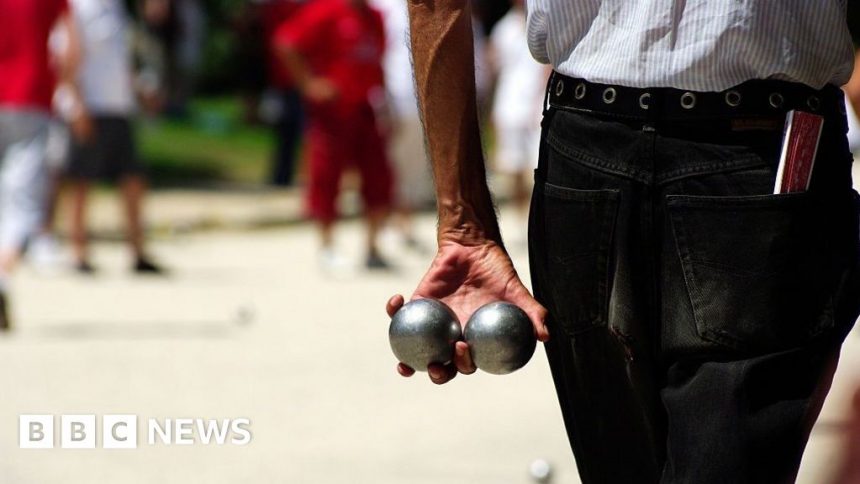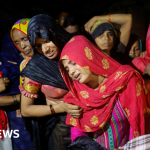In Marseille, pétanque masks political divides ahead of Sunday’s vote
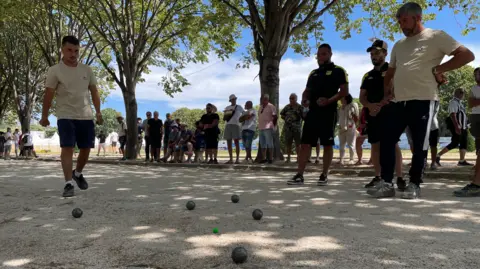 BBC
BBCFirst came the sharp clack of metal on metal, then the scuffing of shoes on gravel, and finally a chorus of polite applause.
On a bright, blustery morning this week, thousands of people gathered in a park in the southern port city of Marseilles, taking their minds off France’s seething political divisions and focusing instead on the beloved local sport of pétanque.
And this was no casual game, but rather a quarter finals match at the World Pétanque Championships – an annual televised event held on France’s Mediterranean coast, and overlapping this year with the nation’s unexpected parliamentary elections.
“The show must go on. Pétanque must go on. Smiling must go on,” said Laurence Astier, head of communications for the championships.
“France is the best nation in the world, of course, at this sport. But the other ones are Thailand and Benin. It’s an international sport,” Astier enthused.
Around her, in the dappled shade of the park’s leafy avenues, the crowds moved between matches, beer in hand, necks craned for a glimpse of the action.
“I lost yesterday,” said George Gonzalez-Gomez, 68, a retired civil servant, with a cheerful shrug.
But even here, the discordant clamour of France’s polarised politics sometimes broke through.
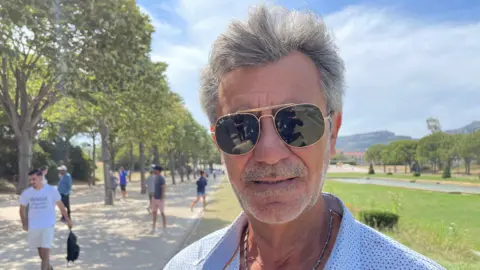
“Fachos,” – fascists – said a man near the entrance, waving a copy of La Marsaillaise, the proudly communist newspaper that was sponsoring the championship. He was referring to supporters of the far-right National Rally, which looks likely to win the most seats in France’s parliament.
“I support the National Rally. We need to fix the country,” countered Gonzalez-Gomez, blaming immigrants for Marseille’s high crime rate.
“It’s like the way you had Brexit. Things were calmer after that. Now there is delinquency, crime, and [Islamist] radicalisation. As for [President] Macron – he is finished,” he said, arguing that France should take back control of its borders from the European Union.
In Marseille, candidates for the National Rally (RN) – the far-right, staunchly anti-immigration party that won 33% of the vote in the first round of France’s parliamentary elections last week – have steered clear of media interviews since their electoral success. Local press are referring to them as “phantom candidates”.
But their members are actively trying to rally support for their party online.
“We’re the last bastion against chaos,” candidate Olivier Fayssat wrote on X.
“Less immigration means fewer homeless people and more money for the people of Marseilles,” Gisèle Lelouis, another RN candidate, posted on the site.
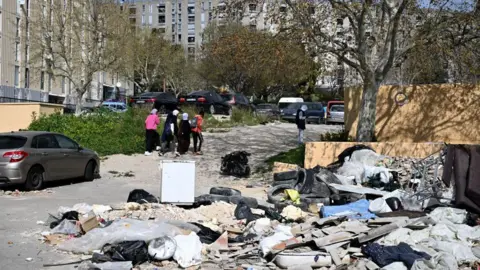 Getty Images
Getty ImagesWith its luxury yachts, ancient architecture, and crowded, impoverished quartiers, Marseille has always been a chaotic melting pot of a city, due to its position on the Mediterranean coast and its history as a gateway to France and beyond.
In recent years National Rally has built up a powerful support base across the south, but has always been strongly challenged by parties from the left and the centre. This election has changed that balance, with President Emmanuel Macron’s centrist candidates already losing their seats in the city in the first round.
“Macron… is not popular here at all,” said Gilles Rof, the local correspondent for Le Monde newspaper, explaining that residents have not yet felt the impact of the president’s multi-billion euro infrastructure project for Marseille, and are, more generally, in a mood to shake things up.
Rof argued that racism lay at the root of much of the anti-immigrant sentiment in parts of the city, and that RN was playing on people’s legitimate concerns about crime.
“The basis of this vote [for RN] is clearly racism. [Their supporters say] there are too many immigrants and too many Arabic people. You can hear that all the time. It’s out in the open,” he said.
Much of the crime is linked to Marseille’s powerful drug gangs, which operate – often quite openly – in some of the poorer suburbs north of the city.
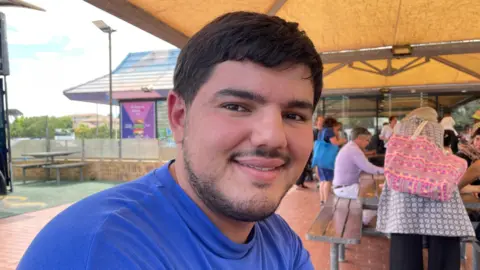
In a windswept neighbourhood one afternoon this week, a small crowd gathered to offer support for their parliamentary candidate, a 20-year-old man of Algerian heritage.
“Front Populaire! Front Populaire! Amine Kessaci! Amine Kessaci!” people chanted, naming France’s new left-wing coalition and its young would-be deputy.
Mr Kessaci’s social activism – focused on tackling crime and on local empowerment – was influenced by the death of his brother in a drug-gang-related murder in 2020.
He said migrants were being scapegoated by the far right for political gain, and that poverty and unemployment needed to be addressed as a priority.
“This election… is a rendezvous with history. The extremists are at the gates of power. [If RN wins] it will be chaos, like what you had in Germany in the 1930s,” he said.
“We need to stop them waging a war against the poor, a war against foreigners. We need to tackle the drug traffickers and help the marginalised.
“The far right have no plan, they just have anger. My parents chose this country and I’m a Frenchman,” the young candidate said, before racing off to meet the deadline to submit his application to run in the second-round vote.



